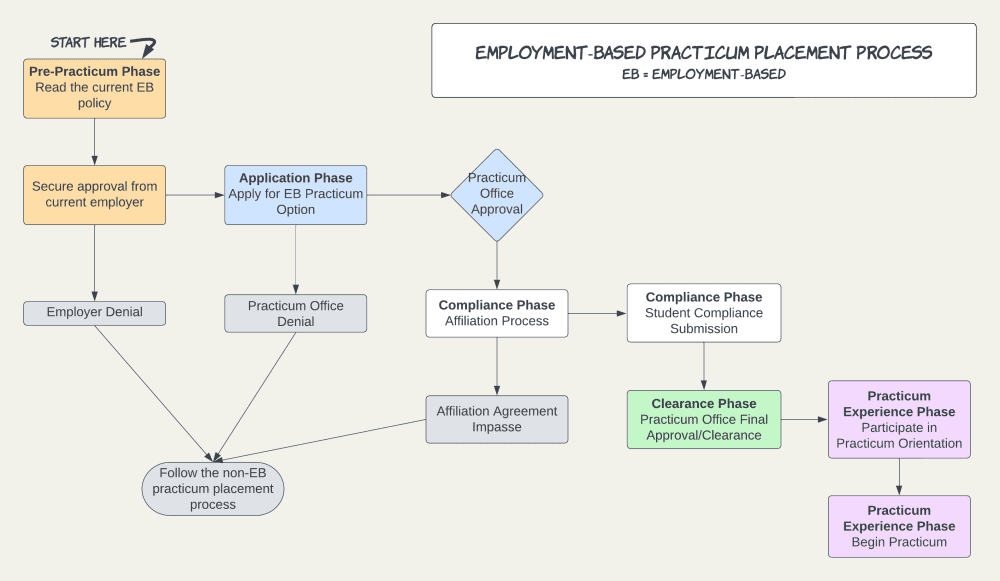Employment-Based Practicum Placements
What is an employment-based Practicum Placement?
Students working in eligible social work related organizations may have the option to complete their practicum placement at their place of employment (CSWE, EPAS, 2022, 3.3.7). An employment-based practicum placement must achieve all of the placement objectives for a social work student. The student must engage in generalist or specialist practice activities under qualified practicum instructors/task supervisors who have been approved by the School of Social Work. The objectives must be reviewed by the student, the prospective practicum instructor/task supervisor, and the designated Faculty Liaison. Additionally, the School of Social Work must be assured that the employing agency supports the placement as an educational experience and is committed to providing the time and supervision to be involved in discrete learning activities with specific learning objectives that are related to the placement objectives. The employing agency is expected to help the student and the university to create and maintain an environment for learning to take place.
Students interested in pursuing an employment-based practicum placement are responsible for securing and maintaining employment in a social work related organization. The Practicum Office does not assist students with securing employment in order to pursue an employment-based practicum placement.
Types of Employment-Based Practicum Placements
Same Work
Student keeps their current role at their job and counts work hours towards 100% of practicum hours.
Combo Work
Student counts some current work tasks to count as practicum hours and also works in a different department/role and/or takes on additional tasks for practicum hours.
Different Work
Student completes 100% of their practicum hours in a different department/role doing different tasks than their current job to earn practicum hours.
Students interested in doing “combo work” or “different work” will need to discuss with their employer whether these tasks can be completed within their normal working hours or if these tasks will require additional hours in addition to your current schedule. All students wanting to pursue employment-based placement, even those planning to complete “same work”, should discuss their plans with their employer to ensure the employer will allow the student to complete the practicum placement at the agency/organization.
Affiliation Agreements for Employment-Based Practicum Placement Agencies
In order for a student to complete a practicum placement with a specific agency, there must be a fully executed Affiliation Agreement between the agency and the university. Once students have applied and been approved by the Practicum Office for an employment-based practicum placement, the Practicum Office will initiate the onboarding and affiliation process. This process can take several months. While it is rare, students should be aware that it is possible that the agency and the university may be unable to agree to the required terms laid out by each party, meaning the student would be unable to complete the placement with that agency. All new employment-based agencies must be formally onboarded by June 1 for the student to begin placement in August.
APPROVAL PROCESS FOR EMPLOYMENT-BASED Practicum PLACEMENTs

- Student reviews the Employment-Based Practicum Placement Policy, found in the Practicum Education Handbook. Please be aware that this policy is updated annually and subject to change.
- Student secures approval from their current employer by having a conversation with all relevant personnel (supervisor, HR, etc.) at the employing agency.
- If denied, student will move forward with the non-employment-based practicum placement process.
- If approved, student will apply for the employment-based practicum placement when submitting their practicum application.
- The Practicum Office will review the student’s application and approve or deny the request for employment-based practicum placement.
- If denied, student will move forward with the non-employment-based practicum placement process.
- If approved, the Practicum Office will reach out to the employing agency and begin the affiliation agreement process.
- If agency and the University are not able to come to an agreement with the terms laid out in the affiliation agreement, student will move forward with the non-employment-based practicum placement process.
- When directed by the Practicum Office, the student will submit compliance requirements and wait for clearance.
- CHHS and the Practicum Office will issue final clearance to the student.
- Student participates in Practicum Orientation.
- Student begins practicum placement.
Next Steps for Students
- Obtain or retain employment in a social work based organization. Students must be employed by January 1st, prior to the academic year when they are scheduled to begin Practicum Placement. For example, if a student is scheduled to begin practicum August 2025 they must be employed at the agency by January 1, 2025. Current BSW and MSW students submit practicum applications the January before beginning practicum placement in August. Incoming MSW students submit practicum applications as soon as possible after accepting the offer of admission.
- Talk with your supervisor and any other relevant staff or departments at your employer. For example, if you work for a large organization, you may also need to talk with HR or another department for approval.
- When requested, provide information to the Practicum Office for review.
- If approved by the Practicum Office, move forward with next steps for compliance and other practicum documentation. More will be shared about these requirements once you are admitted to the program and are moving through the practicum placement process.
Need some talking points for having this conversation with your employer? Download the Employment-Based Practicum Placement Information for Students and Agencies document.
Additionally, students should refer to the employment-based practicum placement policy in the Practicum Education Handbook.